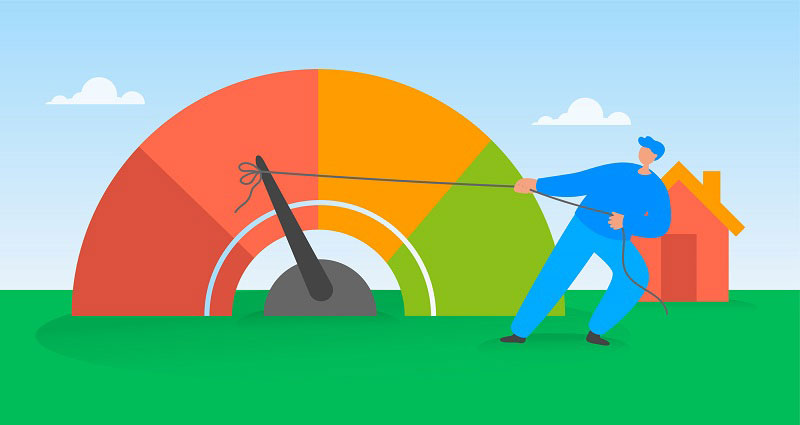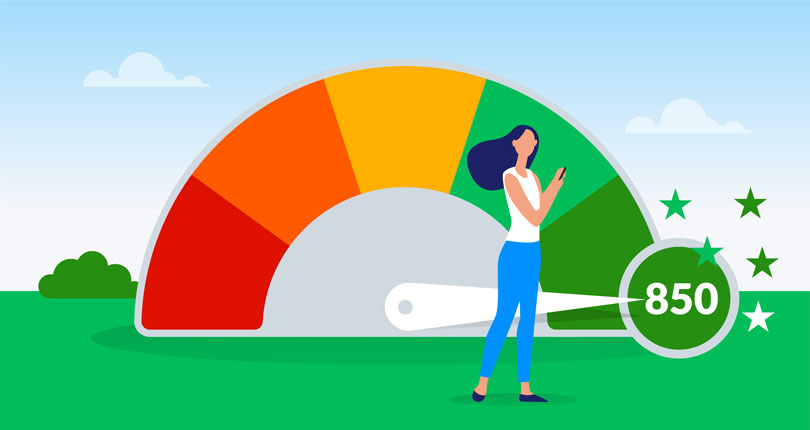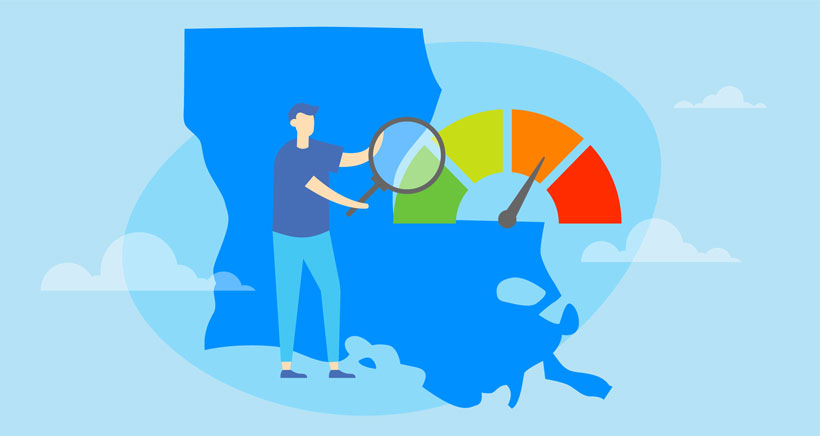Key Insights
- Minimum credit score requirements for mortgages can vary depending on the type of home loan you want and the lender you work with to secure financing.
- A 620 is the minimum FICO® Score you may need to qualify for a conventional loan.
- A FICO® Score of 500 (580 with a smaller down payment) is the minimum score you’ll need to qualify for an FHA loan. Some lenders will require higher scores.
- There is no minimum credit score requirement for VA loans, but certain lenders might not be willing to work with you if you have a FICO® Score under 620.
- With a USDA loan, you should have a FICO® Score of 580 or higher. There is, however, flexibility available in certain situations.
- A 700 FICO® Score or higher is a common requirement with jumbo loans.
When you are ready to borrow money to purchase a home, a lender will examine your credit to see if you qualify for a mortgage. By reviewing your credit information (including your three credit reports and scores), a lender can estimate your creditworthiness. In other words, your credit tells lenders whether loaning you money is a good investment.
Depending upon the type of loan, mortgage lenders will often require you to have a minimum credit score to qualify for financing. If your credit score is too low, you might have a hard time convincing a lender to take a chance on you.
You can earn a decent income and save a sizable down payment, but your credit score could still make or break your chances of buying a house. Beyond merely qualifying, your credit score can also have a meaningful influence on your APR, monthly payment amount, and the overall interest you pay on your loan.
However, low credit doesn’t necessarily mean you can’t buy a house. Lower credit scores typically result in higher interest rates and a harder time qualifying for a mortgage, but you may still have some options.
In this article you’ll discover
What is the minimum credit score needed to buy a house?
| Typical Minimum FICO® Score Per Loan Type |
| Conventional Loan |
620 |
| FHA Loan |
500 (580 with a smaller down payment) |
| VA Loan |
No minimum (Some lenders require 620) |
| USDA Loan |
580 (With flexibility in some situations) |
| Jumbo Loan |
700* |
*With jumbo loans, the loan size can influence the minimum credit score a lender requires.
Credit score requirements vary from lender to lender. And the type of mortgage you apply for can also affect the minimum credit score you’ll need to qualify.
Yet you should keep the following in mind as you go through the details below. If your credit score does not meet the minimum requirement for a specific type of mortgage, there may still be a chance that you can qualify for a loan.
There are also strategies you can use to improve your credit. Better credit can put you in a better position when you seek financing.
Here are the minimum credit scores you typically need to surpass when you fill out a mortgage application.
Conventional loan
A conventional loan requires a minimum FICO® Score of 620. [1] https://www.rocketmortgage.com/learn/what-credit-score-is-needed-to-buy-a-house Keep in mind that when you apply for a mortgage, the lender will check all three of your credit reports and associated scores from Equifax, TransUnion, and Experian.
All three of your scores usually don’t need to be 620 to qualify for a conventional loan. But most lenders want your “middle credit score” to be 620 or higher. So, in general, at least two of your credit scores need to reach that 620 threshold to qualify for a conventional loan.
How conventional loans work
Conventional loans are issued by private lenders, like banks or credit unions. There’s no government agency in the background, like the Federal Housing Administration or the Veterans Administration, that guarantees the loan.
There are two types of conventional loans:
- Conforming loans meet the financing criteria of Fannie Mae and Freddie Mac, two government-sponsored entities that purchase mortgages from lenders.
- Non-conforming loans do not meet the lending guidelines of Fannie Mae and Freddie Mac. So, lenders can’t sell these mortgages to the Government Sponsored Enterprises or GSEs.
Because conventional loans do not have the backing of the government, they can be riskier for mortgage lenders. Non-conforming conventional loans are the most risky.
FHA loan
FHA loans technically require a minimum FICO Score of 500. But if you want to put 3.5% down instead of coming up with a 10% down payment, you’ll need a middle credit score of at least 580.
Also, just because the Federal Housing Administration lets lenders issue FHA loans to borrowers with a 500 FICO Score doesn’t mean all lenders are comfortable doing so. [2] https://www.quickenloans.com/learn/fha-loan-credit-score Some may require a minimum credit score of 620 or higher before they will consider approving you for an FHA loan.
How FHA loans Work
The Federal Housing Administration is a government agency within the U.S. Department of Housing and Urban Development. It plays an important role in the homebuying process for millions of Americans.
The FHA provides mortgage insurance that protects approved lenders against loss. [3] https://www.hud.gov/program_offices/housing/fhahistory So, if a borrower were to default on an FHA loan, the lender could file an insurance claim seeking payment for the outstanding principal balance.
Because FHA loans are insured, there’s less risk involved for lenders. This added financial protection allows lenders the flexibility to approve loans for buyers with lower credit scores.
VA loan
The U.S. Department of Veterans Affairs does not impose a minimum credit score requirement for VA loans. Individual lenders, however, might require a FICO Score of 580 or even 620 to qualify for this type of mortgage. [4] https://www.experian.com/blogs/ask-experian/what-credit-score-do-i-need-to-buy-a-house/
How VA loans Work
The U.S. Department of Veterans Affairs is another government agency that offers a home loan guarantee benefit to help potential homebuyers. In the case of VA loans, the benefit is restricted to service members, veterans, and surviving spouses.
The VA guarantees a portion of loans issued by private lenders, like mortgage companies, banks, and credit unions. The program backs up to $36,000 for loans of $144,00 or less, and up to $25% of loans over $144,000. [5] https://www.va.gov/housing-assistance/home-loans/loan-limits/
USDA loan
The U.S. Department of Agriculture doesn’t have a strict minimum credit score requirement for USDA loans. [6] https://www.experian.com/blogs/ask-experian/what-is-a-usda-loan/ Most lenders want you to have a FICO Score of 640 or higher to qualify. However, scores below this threshold might be accepted (sometimes with alternate credit) through a manual underwriting process. [7] https://www.rd.usda.gov/files/RD-SFH-CreditRequirements.pdf
How USDA loans Work
The U.S. Department of Agriculture works through approved lenders to offer a guaranteed loan program for low- to moderate-income applicants who meet income eligibility requirements (up to 115% of median household income). [8] https://www.rd.usda.gov/programs-services/single-family-housing-programs/single-family-housing-guaranteed-loan-program If you wish to use this type of loan, you must agree the house you’re buying will be your primary residence. Furthermore, the property has to be located within an eligible rural or suburban area.
Jumbo loans
Minimum credit score requirements for jumbo loans can vary depending on how much you want to borrow. In some cases, you might need a FICO Score of at least 700 to qualify. [9] https://www.experian.com/blogs/ask-experian/what-is-a-jumbo-loan/
How Jumbo loans work
A jumbo loan is a kind of non-conforming loan that exceeds the loan limits established in the Fannie Mae and Freddie Mac lending guidelines. Because jumbo loans are higher in value, the lender takes on more risk. So, lenders tend to require higher credit scores and larger down payments for this type of mortgage financing.

How to Rent with Bad Credit
Leasing an apartment or home
with bad credit can be a challenge,
but if you follow the right steps
some landlords may be willing to
work with you.
Download our guide
How higher credit scores impact mortgage loans
Mortgage applicants with higher credit scores can save a significant sum of money over the course of their loans because of more favorable mortgage rates. The table below shows you how much interest rates can vary based on your credit score. You’ll also see how much extra you might have to pay if you decide to buy a house with bad credit.
| Mortgage Estimates$340,000, 30-Year Fixed Loan |
| FICO Score Range |
APR |
Monthly Payment |
Total Interest Cost |
| 760-850 |
2.813% |
$1,399 |
$163,781 |
| 700-759 |
3.035% |
$1,440 |
$178,357 |
| 680-699 |
3.212% |
$1,473 |
$190,143 |
| 660-679 |
3.426% |
$1,513 |
$204,587 |
| 640-659 |
3.856% |
$1,595 |
$234,241 |
| 620-639 |
4.402% |
$1,703 |
$273,076 |
*Source: myFICO Loan Savings Calculator
The difference between the APR you’d receive in the example above with a 639 FICO Score versus a 760 FICO Score is just 1.589%. Yet that seemingly small difference adds up to a great deal of money — both on a monthly basis and over the course of the 30-year loan.
With a credit score of 620-639 you could pay an extra:
- $304 per month
- $109,295 in total interest fees
And this example doesn’t even touch on how much a lender might charge you for a mortgage if your credit score falls below 620. You might pay even more to purchase a home with FICO Scores in the bottom of the fair credit score range (or worse), assuming you can find a lender that’s willing to approve you.
Ways to increase a credit score before a home purchase
A low credit score limits your borrowing ability. But if you’re unhappy with your credit score, there are proven steps you can take to try to improve it. Here are some strategies that might help.
Paying Bills on Time
Your payment history is the single most important factor that influences your credit score. It accounts for 35% of your FICO® Score.
Paying bills on time can help you build and maintain a higher credit score. But if you already have a credit history that contains late payments, there’s some good news as well.
Any credit score damage from payment delinquencies should fade over time. As you consistently pay on time moving forward, your credit score should improve in increments until those old late payments finally age off your credit report.
In some cases, you may need to open accounts to try to build positive payment history through on-time payments. As someone with no credit history or damaged credit, this might be a challenge. However, with accounts like credit builder loans and secured credit cards, you may be able to qualify for financing even with damaged credit or no credit.
Pay down credit cards
Americans hold around four credit cards on average, according to Experian. [10] https://www.experian.com/blogs/ask-experian/average-number-of-credit-cards-a-person-has/ When you use them wisely, a credit card can be a great way to build your credit rating. But if you have high credit card balances relative to your credit limits, that behavior could lead to lower credit scores.
Credit scoring models, like FICO and VantageScore, evaluate your credit utilization ratio when calculating your credit score. Credit utilization is a major component that contributes toward 30% of your FICO® Score.
To calculate your credit utilization rate, divide your credit card balances by the total of your credit limits. For example, if you have four credit cards with a total credit limit of $10,000 between those accounts and you owe $3,000 in credit card debt, your overall credit utilization rate is 30%.
Note: Credit scoring models consider both your overall credit utilization rate and your per-card utilization rate when calculating your credit score.
Low credit utilization rates are best from a credit scoring perspective. So, if you’re looking for an actionable way to give your credit score a quick boost, paying down your credit card balances (especially on highly utilized accounts) could be wise.
Maximize your credit score in other areas
In addition to your payment history and credit utilization ratio, the other factors that influence your credit score are as follows:
Learning about the major factors that affect your credit score puts you in a better position to earn and keep a good credit rating.
With length of credit history, the older the average age of the accounts on your credit report, the better. If you have a young credit file, you may have to be patient and wait for it to grow older over time. Yet a loved one who’s willing to add you as an authorized user on an older credit card might be able to speed the process along for you as well.
As far as credit mix is concerned, having a variety of account types on your credit report can work in your favor. If you only have credit cards open, you might want to consider opening an installment loan (like a credit builder loan). And if you only have installment accounts open, you might want to add some revolving credit cards to your report instead.
Finally, the new credit component of your credit score refers to how often you apply for and open new accounts. Too many credit applications in a short period of time might damage your credit score (though usually only a little). At the same time, you never have to worry about checking your own credit report. Personal credit checks don’t damage your score.
Review credit reports and dispute errors
Credit errors might damage your credit scores in an unfair way. As a result, you want to make sure the information in all three of your credit reports is 100% accurate.
Start by requesting a free credit report from each of the major credit bureaus. The Fair Credit Reporting Act (FCRA) entitles you to a free report from each credit bureau once every 12 months. The official site to request these free reports isAnnualCreditReport.com.
Once you download your credit reports, go through each one of them in detail. If you discover mistakes, the FCRA lets you dispute those errors with the associated credit bureau.
What to do if your credit score is lower than 580
Your credit score will impact the type of mortgage loan for which you can qualify (and whether you can qualify for any home loan in the first place). The higher your credit score climbs, the more borrowing options you have when you’re ready to buy a home.
You might be eligible for a government-backed home loan with a FICO Score of 580 or higher.
If your credit score falls below this mark (and you don’t feel like you have time to improve your credit first), one of the options below might help.
Mortgage brokers
If your credit score prohibits you from securing a traditional mortgage, you might want to consider working with a mortgage broker. A mortgage broker may be able to work on your behalf to find a lender that specializes in working with home buyers with credit challenges.
Increase down payment
Lenders are all about minimizing risk. One way to minimize risk for the lender is to increase the size of your down payment. For example, if you can afford a 10% down payment, some lenders will approve you for an FHA loan with a FICO Score as low as 500. [11] https://www.quickenloans.com/learn/credit-score-to-buy-a-house
Other options
If you have tried everything above and are still finding it difficult to secure a mortgage, here are some more possibilities:
- Find a co-signer: You can ask a family member to serve as a co-signer on your loan. Should you get behind and fail to make your monthly payments, then the co-signer will become legally responsible for making the loan payments. Keep in mind that your loved one will be taking a big gamble if they agree. If you fall behind on your payments, those delinquencies could damage both your credit scores and the scores of your co-signer. Additionally, your co-signer might find it difficult to qualify for future loans (due to debt-to-income ratio issues) even if you pay on time.
- See if you qualify for a Habitat for Humanity home: Habitat for Humanity helps people with low incomes and pressing housing needs to become homeowners. You can learn more about the qualification requirements and application process at Habitat.org.
Government-backed programs, mortgage brokers, and nonprofit organizations can all help to make the American dream of owning a home a reality. Your best bet is to make sure your credit is in good shape before you apply for a mortgage. But you might still have some options even if your credit score is on the lower end of the spectrum.
Sources
Michelle L. Black
Michelle L. Black is a leading credit expert with over 17 years of experience in the credit industry. She’s an expert on credit reporting, credit scoring, identity theft, budgeting and debt eradication.
Ana Gonzalez Ribeiro
Ana Gonzalez Ribeiro, MBA, AFC® is an Accredited Financial Counselor® and a Bilingual Personal Finance Writer and Educator dedicated to helping populations that need financial literacy and counseling. he also founded the personal financial and motivational site www.Ace the Journey.com and translated into Spanish the book "Financial Advice for Blue Collar America" by Kathryn B. Hauer, CFP. Ana teaches Spanish or English personal finance courses on behalf of the W!SE (Working In Support of Education) program and has taught workshops for nonprofits in the NYC area.
 Back to Data & Guides
Back to Data & Guides






